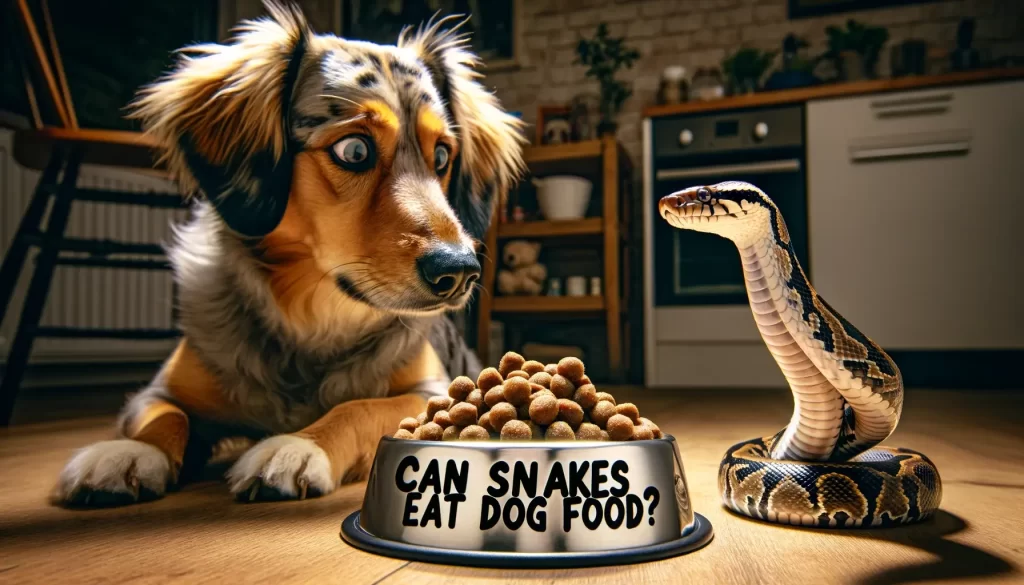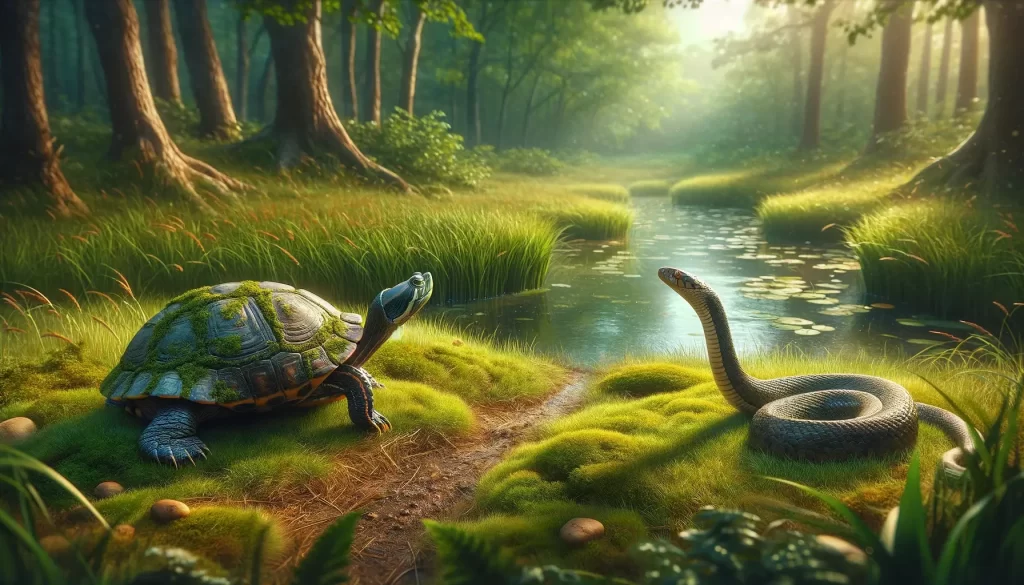Did you know that some snake owners mistakenly believe that dog food is a suitable replacement for their pets’ natural diet?
This widespread misconception has led to numerous health issues and nutritional imbalances in snakes.
No, snakes cannot eat dog food as it does not meet their nutritional needs. Snakes require a diet that consists of rodents, birds, eggs, and small reptiles to thrive.
In this article, we will explore the truth behind this myth and delve into the importance of understanding a snake’s dietary needs.
Key Takeaways:
- Snakes cannot thrive on a diet consisting solely of dog food.
- A snake’s natural diet includes rodents, birds, eggs, and small reptiles.
- Understanding a snake’s nutritional needs is crucial for its overall health and well-being.
- Feeding snakes an improper diet can lead to nutrient deficiencies and digestive issues.
- Consulting with experts and conducting research is essential for providing proper nutrition to pet snakes.
Understanding Snake Nutrition
When it comes to keeping pet snakes healthy and thriving, understanding their nutrition is paramount.
Snakes have specific dietary requirements that must be met in order to ensure their overall well-being and longevity.
In this section, we will explore the natural diet of snakes and delve into their nutritional needs.
What Do Snakes Naturally Eat?
In their natural habitat, snakes consume a variety of prey, including rodents, birds, eggs, and small reptiles.
These food sources provide snakes with the necessary nutrients to sustain their energy levels and support their bodily functions.
It is important to note that different snake species may have slightly different dietary preferences, depending on their natural habitat and physiological characteristics.
The Nutritional Needs of Snakes
Snakes require a balanced diet to meet their nutritional needs. Proteins, fats, and vitamins are essential components of a snake’s diet.
Proteins are crucial for muscle development and overall growth, while fats provide energy and aid in digestion.
Adequate vitamin intake is necessary to support various physiological processes in snakes.
In addition to proteins, fats, and vitamins, snakes require a good source of calcium.
Calcium plays a vital role in maintaining healthy bones and preventing metabolic bone diseases in snakes.
While snakes can derive calcium from their prey, it is important to ensure that they receive proper supplementation to maintain optimal calcium levels.
The Truth About Snakes and Dog Food
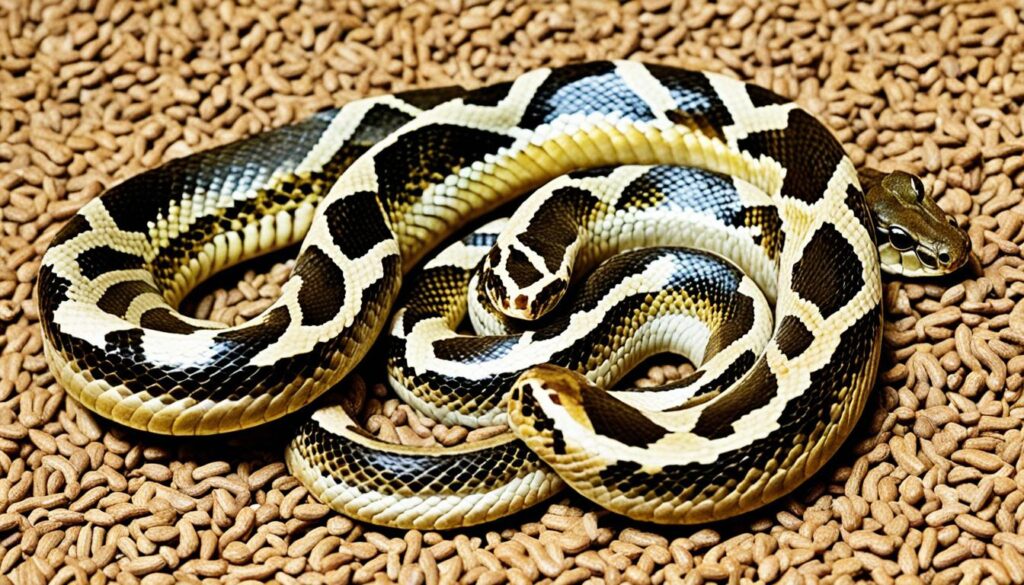
When it comes to feeding pet snakes, there are many misconceptions about what they can and cannot eat.
One common question that arises is whether snakes can digest dog food. In this section, we will explore the truth behind this topic and the potential risks and problems associated with feeding snakes dog food.
Can Snakes Digest Dog Food?
Snakes have specific dietary needs that are different from those of other animals, including dogs.
While snakes are capable of swallowing and digesting a wide variety of prey in the wild, including rodents, birds, and reptiles, dog food may not be suitable for their digestive systems.
Unlike dogs, snakes have unique digestive systems that are designed to process a high-protein, low-fiber diet.
Dog food, on the other hand, is formulated to meet the nutritional needs of canines and may contain ingredients that are not ideal for snakes.
Therefore, it is unlikely that snakes can fully digest and derive adequate nutrition from dog food.
It’s important to note that snakes are carnivorous animals and require a diet that is rich in animal protein.
Feeding them a diet primarily composed of dog food can lead to nutrient deficiencies and health problems in the long run.
Potential Risks and Problems
Feeding snakes dog food can pose several risks and problems due to the differences in nutritional content between dog food and a snake’s natural diet.
Some of these risks include:
- Nutrient deficiencies: Dog food may not provide snakes with the essential nutrients they need to thrive. This can result in malnutrition and a weakened immune system.
. - Digestive issues: Snakes may struggle to digest dog food properly, leading to digestive problems such as constipation or regurgitation.
. - Weight gain or obesity: Dog food tends to be higher in fat and carbohydrates compared to a snake’s natural diet. Regular consumption of dog food can lead to weight gain and obesity in snakes, which can further contribute to health issues.
. - Imbalanced calcium-phosphorus ratio: Snakes require a proper calcium-phosphorus ratio in their diet to maintain healthy bones and prevent metabolic bone disease. Dog food may not provide this balance, leading to skeletal problems.
It’s important to prioritize the nutritional needs of snakes and provide them with a diet that replicates their natural prey as closely as possible.
This can help ensure their overall health and well-being.
Why Dog Food Isn’t Suitable for Snakes
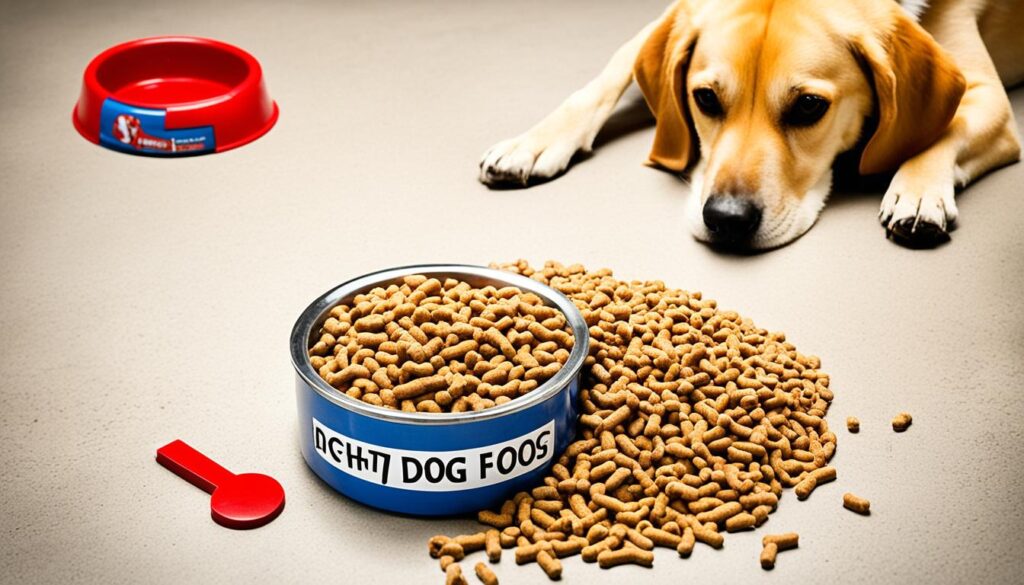
When it comes to feeding pet snakes, it’s important to understand that dog food is not a suitable primary diet for these reptiles.
There are several specific reasons why snake owners should avoid feeding their pets dog food.
Differences in Nutritional Profiles
One of the main reasons why dog food is unsuitable for snakes is the significant difference in nutritional profiles between the two.
Dog food is specifically formulated to meet the dietary needs of dogs, which are omnivorous animals with different nutritional requirements than snakes.
Snakes, on the other hand, are carnivorous reptiles that have evolved to thrive on a diet primarily consisting of rodents, birds, eggs, and small reptiles.
These differences in nutritional needs mean that dog food may not provide snakes with the necessary levels of proteins, fats, and vitamins required for optimal health.
Snakes require high-quality proteins for growth and energy, while dog food may not have sufficient protein content tailored to meet their needs.
Additionally, the fat content in dog food may be too low or of the wrong type, leading to potential nutrient deficiencies in snakes.
The Impact of Improper Diet on Snakes
Feeding snakes an improper diet, such as dog food, can have a negative impact on their health and well-being.
Snakes that are consistently provided with an inadequate diet may experience nutritional deficiencies, which can lead to a variety of health problems.
These issues may include stunted growth, weakened immune systems, reproductive issues, and even organ failure.
It is crucial for snake owners to prioritize the correct nutritional needs of their pets to ensure their long-term health and happiness.
Providing a balanced diet that mimics their natural food sources is essential for proper growth, development, and an optimal quality of life.
Proper Feeding Practices for Pet Snakes
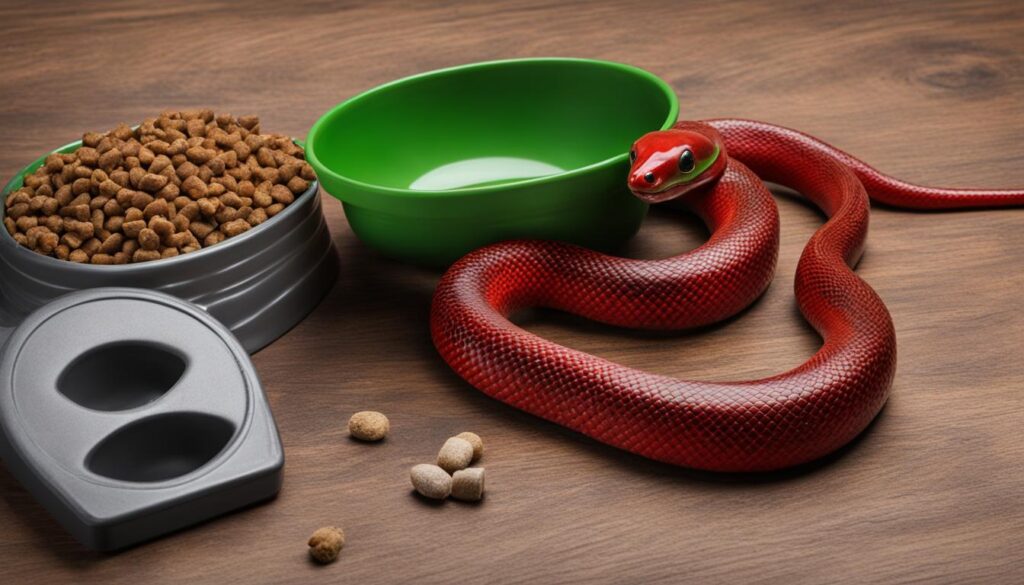
Feeding pet snakes a proper diet is essential for their health and well-being. By following the recommended feeding practices, you can ensure that your snake receives the nutrients it needs to thrive.
Recommended Diet for Snakes
When it comes to feeding pet snakes, it is best to replicate their natural diet as closely as possible.
The recommended diet for snakes includes:
- Frozen rodents: This is the most common and convenient option for feeding pet snakes. You can find a variety of frozen rodents in pet stores, such as mice, rats, and rabbits, that are appropriately sized for your snake.
. - Commercially-prepared snake diets: Some snake species may benefit from commercially-prepared snake diets, which are specifically formulated to meet their nutritional needs. These diets often contain a balanced combination of proteins, fats, and vitamins.
It is important to consult with a reptile veterinarian or experienced snake owner to determine the appropriate diet for your specific snake species.
Foods to Avoid
While there are suitable food options for feeding pet snakes, there are also certain foods that should be avoided due to potential harm or inadequate nutritional value.
It is best to avoid the following foods when feeding pet snakes:
- Live prey: Feeding live prey to snakes can be dangerous as it may result in injury to either the snake or the prey. Additionally, live prey can carry parasites or diseases that could be transmitted to the snake.
. - Insects: While some snake species may eat insects in the wild, they should not be the primary food source for pet snakes. Insects alone do not provide the necessary balance of nutrients for snakes.
. - Fruits and vegetables: Snakes are carnivores and do not require fruits or vegetables in their diet. These foods can be difficult for snakes to digest and may lead to digestive issues.
By avoiding these foods and opting for the recommended diet options, you can ensure that your pet snake stays healthy and thrives in its captive environment.
Addressing Common Misconceptions About Feeding Snakes
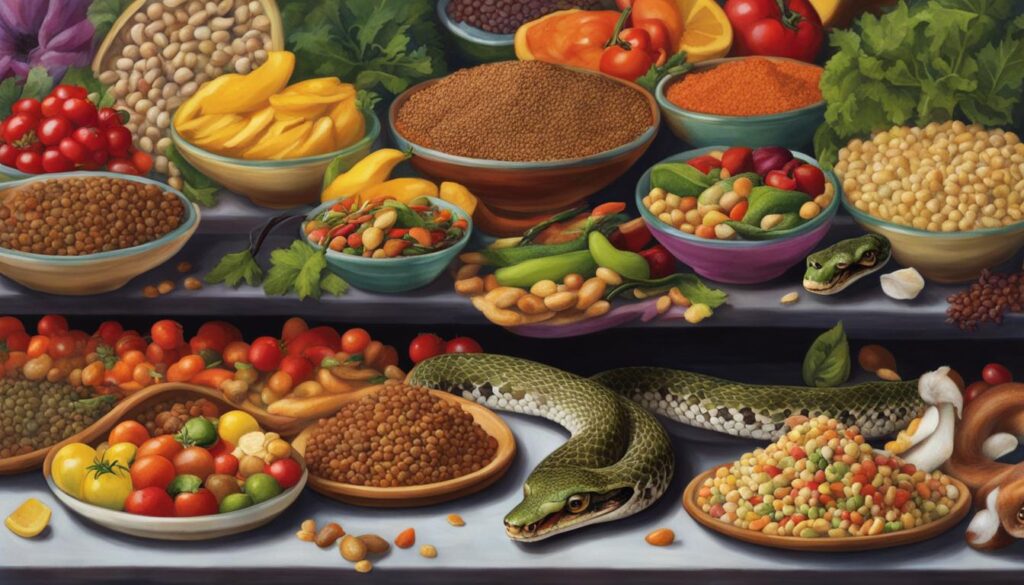
Feeding snakes can be a topic of misconceptions and myths that can confuse snake owners and enthusiasts.
It’s important to debunk these misconceptions and provide accurate information to ensure the well-being of pet snakes.
Let’s explore some common myths about snake diets and the importance of research and expert guidance.
Debunking Myths About Snake Diets
One common misconception is that all snakes can eat the same food. In reality, snake species have different dietary requirements based on their natural habitat and physiological needs.
Some snakes may eat only rodents, while others may require a more varied diet of birds, eggs, or small reptiles.
It’s crucial to understand and meet your snake’s specific nutritional needs to maintain its health.
Another myth is that snakes can survive solely on one type of prey. While some snakes may have preferences for certain types of food, it’s essential to provide a diverse diet to ensure they receive all the necessary nutrients.
Feeding a snake only one type of prey can lead to nutrient deficiencies and health issues.
Importance of Research and Expert Guidance
When it comes to feeding snakes, conducting proper research is crucial. Look for reputable sources of information such as scientific articles, books, and trusted websites dedicated to herpetology.
Additionally, consult with experienced snake owners or exotic pet veterinarians who can provide expert guidance based on their knowledge and experience.
Snake diets require careful consideration due to the unique needs of each species. Expert guidance can help you make informed decisions regarding the best diets for your pet snakes.
They can provide valuable insights into the specific nutritional requirements and feeding techniques to optimize your snake’s health and well-being.
Remember, feeding snakes is not a one-size-fits-all approach. By addressing common misconceptions, conducting thorough research, and seeking expert guidance, you can ensure that your pet snakes receive the proper nutrition they need for a healthy and thriving life.
Conclusion
In conclusion, it is clear that snakes should not be fed dog food as their primary diet. Throughout this article, we have unraveled the myths and misconceptions surrounding snake diets and emphasized the importance of understanding snake nutrition.
Snakes have specific nutritional needs that are best met through their natural diet, which consists of rodents, birds, eggs, and small reptiles.
Dog food lacks the proper nutritional content and balance required for snakes to thrive.
Feeding snakes dog food can lead to various risks and problems, including nutrient deficiencies and digestive issues.
It is crucial to provide a proper diet for pet snakes to ensure their health and well-being.
Therefore, it is essential for snake owners to research and seek expert guidance when it comes to feeding their pets.
Consulting with exotic pet veterinarians or experienced snake owners can provide valuable insights and ensure that snakes receive the appropriate diet for their specific needs.
Frequently Asked Questions
Q: Can you feed snakes dog food?
A: No, feeding snakes dog food is not appropriate. Snakes require a diet that consists of whole prey, such as rodents, birds, or insects, depending on the species. Dog food does not meet their nutritional needs.
Q: Are snakes attracted to dog food?
A: Snakes are not typically attracted to dog food. They are carnivorous and prefer live or frozen prey. However, dog food might indirectly attract rodents, which in turn could attract snakes.
Q: Will black snakes eat dog food?
A: No, black snakes (rat snakes) will not eat dog food. They primarily eat rodents, birds, eggs, and sometimes amphibians, depending on their natural habitat and available food sources.
Q: Do snakes like cooked meat?
A: Snakes generally do not eat cooked meat. They have evolved to eat whole prey, which provides them with necessary nutrients in the right proportions, including bones and organs.
Q: Can you give snakes treats?
A: While the concept of “treats” is not applicable to snakes in the same way it is to pets like dogs, offering occasional variety in their diet with different appropriate prey items could be considered a form of treat.
Q: Can pet snakes eat human food?
A: Pet snakes should not be fed human food. Their diets need to consist of species-appropriate prey to ensure they receive all necessary nutrients for their health and well-being.
Q: What do snakes like to eat the most?
A: Snakes prefer eating prey that resembles their natural diet in the wild. This can include mice, rats, rabbits, fish, and insects, depending on the snake’s species and size.


